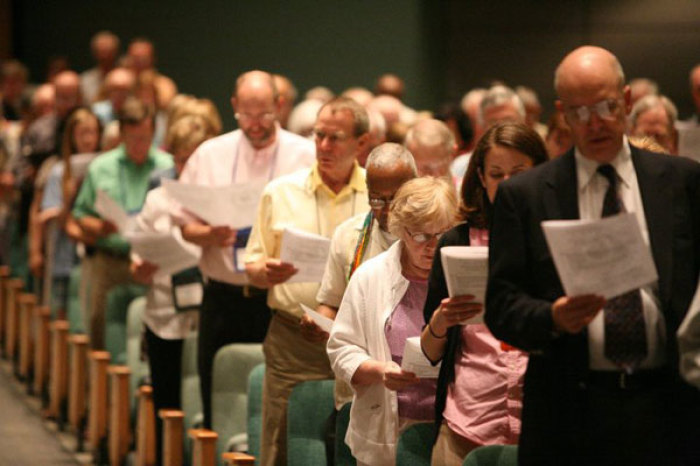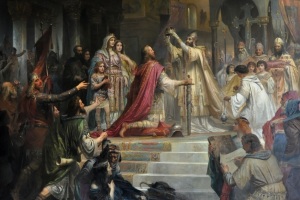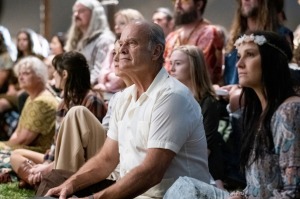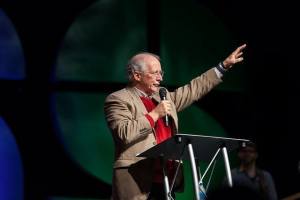PCUSA committee passes resolution declaring Israel's treatment of Palestinians 'apartheid'

A Presbyterian Church (USA) committee has passed a resolution declaring Israel an apartheid state at its General Assembly Tuesday.
The motion was one of several related to the Middle East policy taken up by the assembly's International Engagement Committee during the mainline Protestant denomination's annual gathering in Louisville, Kentucky.
Amendment INT-02, titled "On Recognition That Israel's Laws, Policies, and Practices Constitute Apartheid Against the Palestinian People," passed on a 28-3 committee vote Tuesday afternoon.
The committee's recommendation to the General Assembly — which was discussed extensively at the annual meeting — was ultimately approved with an amended version recognizing that the "government of" Israel's laws, policies and practices regarding the Palestinian people "fulfill the international legal definition of apartheid."
"This overture is pursued with the hope it will lead to a peaceful reconciliation for the people of Israel and Palestine similar to that which occurred in South Africa when apartheid was internationally acknowledged," the resolution states.
The document compares Israel's policies in the West Bank to the apartheid in South Africa when there "was serious injustice, widespread suffering, and major human rights abuses ... because of apartheid laws, practices, and policies that established a preferential legal status and material privileges to one group of people based on their identity while discriminating against another group based on their inferior status."
"It is hoped that the Israeli government policies toward the Palestinian people will undergo a similar transformation if Israeli apartheid is internationally acknowledged," the resolution reads.
"Each year the ordeals and injustices suffered by the Palestinian people in the West Bank, Gaza, and Israel continue. Land is expropriated, homes are demolished, and freedom of movement is restricted. The combination of Israeli settlement colonies on Palestinian land, the bypass roads connecting these settlements, and the Separation Wall creates a network of barriers that confine Palestinians to live in separate reserves and ghettos. The rights to work, education, freedom from arbitrary arrest, peaceful assembly, and freedom of expression granted under international law are restricted or denied."
Much of the debate in the committee centered on condemning the Israeli government's policies without condemning the Israeli people.
One attendee introduced a substitute motion that recommended new language to contextualize the Israeli-Palestinian conflict "from the lens or perspective of the United States' own history with racism and inequity."
"In consultation with several of my colleagues, we thought it might be helpful [to add] an introductory paragraph saying we understand what racism looks like and what apartheid looks like because of our own experience in the United States, and also saying that gives us a perspective to know what it looks like and we do see it here," said Nicole Wilkinson, from Southern New Jersey Presbytery, who made the recommendation.
That recommendation received resistance and was voted down.
The motion was one of four about Israel and Palestine, including a "statement of concern for the peace of Jerusalem" and a "Call for Ending the Siege of Gaza and Collective Punishment of Innocent Palestinian and Israeli Citizens."
All four motions passed.
Presbyterians for Middle East Peace said in a statement that the committee's recommendation to the General Assembly should be rejected, claiming it "made a mockery of the PCUSA's historic commitment to hearing all sides and doing deep research on issues prior to taking controversial decisions."
"Members of the committee voiced concerns about wanting to hear both sides," the statement reads. "In fact, only one side was heard: voices of historic anti-Israel activists. In their opening remarks, the overture advocates stated that there was large percentage of Jews both in Israel and America who believe that Israel is an apartheid state, but there was no evidence given to support such a claim."
"Our fear going into this GA was that there would not be a real conversation about the issue of apartheid, and our fears were realized," the statement continued. "There was no U.S. Jewish or Israeli voice asked to speak to the committee. There were no representatives of the thousands of organizations that have not deemed Israel to be an apartheid state. In fact, the committee did not hear any Palestinians asking the PC(USA) to make such a statement. Rather, the committee chose to hear from three white men that this is what the Palestinians were asking us to do."
A small but vocal group of protesters with the Philos Action league, a Christian organization that stands in solidarity with the Jewish community, waited outside the committee proceedings to lobby voting members to oppose the resolution. The group claims the resolution mirrors the language of recent Amnesty International and the United Nations Human Rights Council Commission of Inquiry reports.
Luke Moon, deputy director of The Philos Project, called the vote "Jew hatred."
"Sadly, the International Committee of Presbyterian Church USA passed the motion to label Israel an apartheid state. They ignored our plea to reject antisemitism and sunk further in their Jew hatred. Lord, in your wrath, remember mercy," Moon wrote on Twitter.
The group also described the resolution as "the latest in a string of similar anti-Israel positions adopted by Presbyterian Church USA since 2004."
As the largest Presbyterian denomination in the United States, PCUSA has over 8,000 congregations, 1 million members and 18,000 clergy members.
Earlier this year, the head of the PC(USA) released a statement in honor of Martin Luther King Jr. Day, declaring the "continued occupation in Palestine/Israel is 21st-century slavery and should be abolished immediately."
In the January statement, PC(USA) Stated Clerk Rev. J. Herbert Nelson II called on the Jewish community in the United States to "influence the call to join the U.S. government in ending the immoral enslavement."
In 2014, the PC(USA) General Assembly voted 310-303 to divest from Caterpillar, Hewlett-Packard and Motorola Solutions due to their reported business ties to Israel. The move was criticized by organizations such as the Anti-Defamation League and the Union for Reform Judaism.
The disputed territories are those in the West Bank (including East Jerusalem) and Gaza Strip captured by Israel in the Six-Day War of 1967. Israel has controlled those territories for over five decades but the international community has long debated sovereignty over those territories. Many, including the United Nations, have opposed Israel's plans to annex the West Bank, claiming it would seriously harm a two-state solution.





























